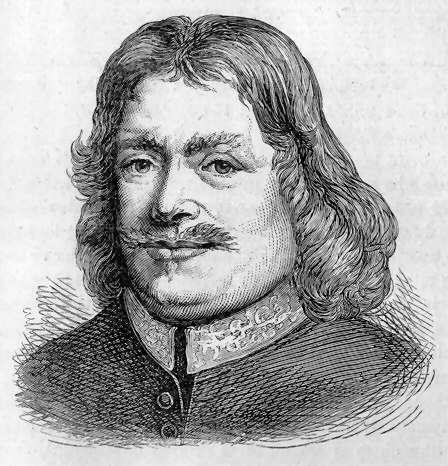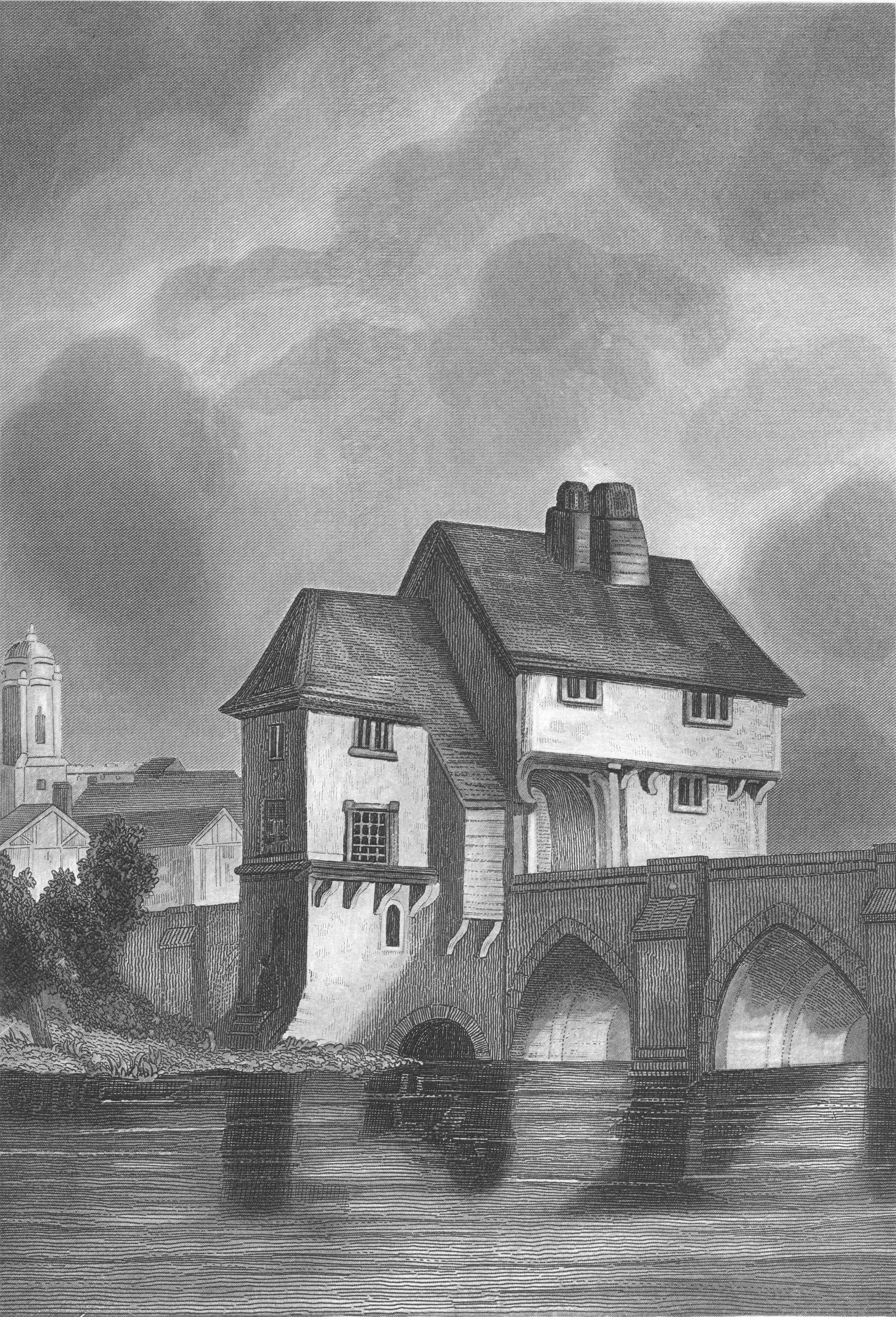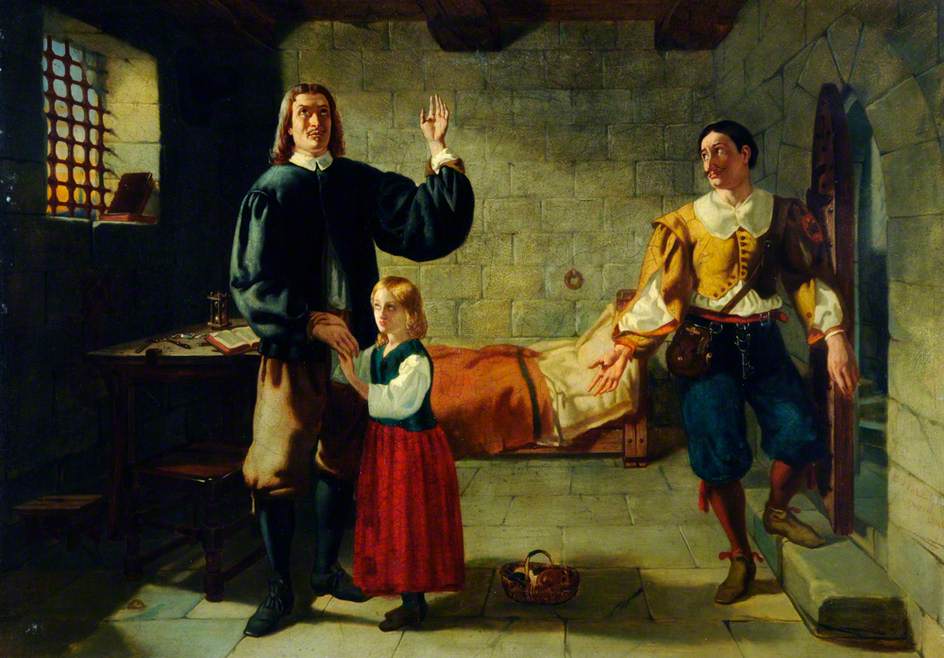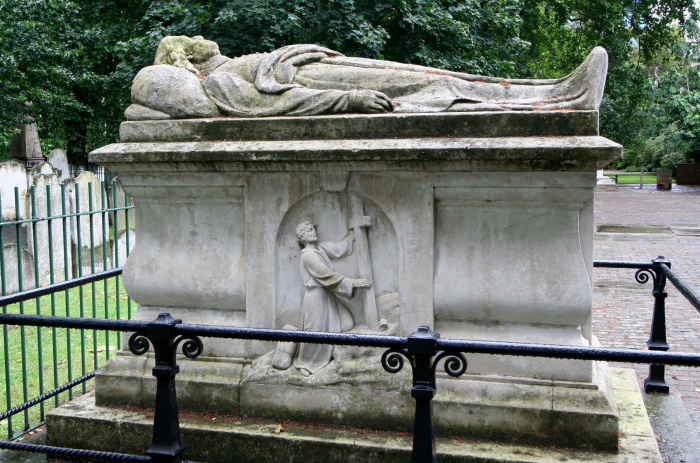

JOHN BUNYAN,
IN the little village of Elstow, near Bedford, England, in the year 1628, was born John Bunyan, the author of "Pilgrim's Progress." His father was a tinker, and brought up his son to the same trade, giving him but little education. While a mere child, Bunyan seems to have had very serious thoughts and questionings about life, death, and the hereafter.
He had been taught the doctrine of eternal punishment in hell fire, and so keenly did his imaginative mind take hold of the reality that its mere mention would set him into a fit of violent shaking. As he grew older, however, he says that he was so much taken up with the village sports and pastimes with young companions that he forgot his former terrors, and came to be the gayest among the gay.
At the age of seventeen Bunyan enlisted in the parliamentary army; but all that is known of this part of his life is that in an important siege at which he was present, he allowed another soldier who wished to do so, to take his place as sentinel.
The soldier lost his life, while Bunyan was spared.
He always regarded this as a direct interposition of Providence.
At the age of twenty he returned home, and married one as poor as himself. But though they had not between them so much household stuff as a spoon or a dish, his wife Elizabeth had two books left her by her father when he died. These were, "The Plain Man's Pathway to Heaven," and "The Practice of Piety;" they proved to be to Bunyan "meat in due season." By the reading of these books he again became much exercised in regard to religious things. He had a very tender conscience, and suffered much because of the sins of his past life, the most ordinary of which were exaggerated in his mind to great heinousness; and because of his expression of these feelings in some of his writings, many have been led to think that he was at one time a very wicked and dissolute man. He was sorely tempted and buffeted by Satan for some time, but gradually his mind became more quiet, and he found peace in believing. In this he was much helped by reading an old book of Martin Luther's, which he chanced to find in one of his journeys.
But Bunyan was not satisfied with finding the Saviour precious to his 'own soul; he must needs teach the gospel of salvation to his friends and neighbors. So he began to preach to the poor people of Bedford; and as he went about the country in his occupation of tinker, he talked and preached to those who would hear him of religious things. From his own experience, he was well calculated to help and encourage the doubting sinner who would fain seek Christ.
For five years he kept on with his good work, when a change in the political affairs of the kingdom put him in prison, together with many other good people.

Jail
The first picture on this page is of Bedford Jail, where this good man was confined for twelve years. His persecutors continually told him that if he would promise to stop preaching, he should immediately be released. This must have been a severe trial of his faith, especially as he knew his wife and six small children, one of whom had been blind from her birth, were suffering for the necessities of life. But neither sneers, threats, nor poverty could shake his resolution; he always firmly answered, "If you let me go today, I will preach again tomorrow." Not being able to work at his old trade in the prison, he made tagged laces, which were furnished to peddlers, and so helped to support his family. But while his hands were thus employed, he lost no opportunity of preaching to the prisoners. He also spent what time he could get in writing. Indeed, it was during this twelve years of imprisonment that he wrote "Pilgrim' s Progress," which has given him such a 'world-wide fame.’

The misery of Bunyan's family and his own courage at last seemed to prevail on his persecutors; and the rigor of his confinement was relaxed, and in 1671 he was released altogether.
In 1678 he published the first part of his great work, and in 1684 the second part. At first it was read by only humble people, but they received it gladly. It soon, however, had a very rapid circulation. During the life of the author ten or fifteen editions were published, and he had the satisfaction of knowing that it was eagerly read and reread by English-speaking people in all parts of the world. It was also translated into other languages; and probably no book except the Bible has been so universally read and admired by all classes,—the rich and the poor, the learned and the ignorant.
After his release from prison, Bunyan continued to preach without further molestation. He finally came to be quite a popular preacher, and the people of Bedford built him a chapel to speak in.
Every year he was in the habit of making a journey to London, where large crowds gathered to hear his sermons. In the summer of 1688, though in feeble health, he set out on a labor of love,—to reconcile an angry father to his son. His errand accomplished, he was on his way home, when he was caught in a heavy rainstorm and completely drenched. He rode on, however, to London where he intended to spend the night, and continue his way home the next day. But he was taken with a violent fever, and died there after a few days, at the house of a friend, who did all in his power to save the life of the good man. His constitution had been so enfeebled by his long imprisonment that the disease found him an easy prey.
He was buried in a humble graveyard' in the suburbs of London, now known as Bunhill fields. His friends had an appropriate monument put over his grave, with his own sculptured form lying on the top. The second picture on the first page of the paper will give you an idea of this tomb. The great and good Dr. Watts, the author of so many of our favorite hymns, also rests in this graveyard, near John Bunyan.
E. B. G
